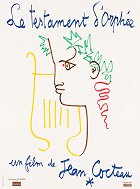Realização:
Jean CocteauArgumento:
Jean CocteauCâmara:
Roland PontoizeauElenco:
Jean Cocteau, Yul Brynner, Lucia Bosé, Charles Aznavour, Claudine Auger, François Périer, Daniel Gélin, Jean-Pierre Léaud, Jean Marais, Pablo Picasso (mais)Conteúdos(1)
Vestido com o traje de Luís XV, o Poeta encontra fantasmas simbólicos através de uma viagem misteriosa. Sem uma delimitação de espaço e tempo, ele revisita a sua infância, adolescência e velhice, encontra-se com uma cigana, com a sua mãe e com personalidades mitológicas. Numa mistura de realidade e poesia, ele procura uma sabedoria divina que faz a ligação entre as suas obras e as experiências que tem consigo mesmo. (Leopardo Filmes)
(mais)Críticas (1)
Cocteau just confirmed his initial words: "film is an admirable medium of poetry." Who else could confirm it in practice than a poet triumphing in all other spheres of poetry? A poet balancing his life and work with the knowledge that both will soon come to an end, he reaches the source of all poetry with the knowledge of death, which can create a flower through the death and sacrifice of the poet. That flower thus turns red with the blood of the poet. P.S. Do not make the same terrible mistake as me and first acquire Cocteau's film Orpheus (1950), you will save yourself frequent speculation about what meanings you may be missing during the numerous autobiographical symbols, often stemming from this film. But even if you don't understand everything and despite the numerous comments, whether directly pronounced by Cocteau himself or his voice-overs (which beautifully symbolizes the poet not only as the creator of the work /narrator's position/, but also as the character engulfed by his work and dragged by its laws /Cocteau as a character in the film/), you will be encouraged to watch it again and you shouldn't be afraid because, after all, "you mustn't want to know everything!"
()

